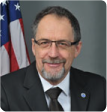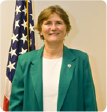Meet Our Leadership Team
NOAA Fisheries employs about 4,800 staff including scientists, policy managers, and enforcement officers, located across the country at our regional offices, science centers and labs, and national headquarters in Silver Spring, Maryland. Below you will find the leaders of our agency.
- Executive
Leadership - National Program
Office Directors - Regional
Administrators - Science
Center Directors
Eileen Sobeck

Assistant Administrator for Fisheries
» View Bio
Paul Doremus, Ph.D.

Deputy Assistant Administrator for Operations
» View Bio
Richard Merrick, Ph.D.

Director, Scientific Programs and Chief Science Advisor
» View Bio
Samuel D. Rauch III

Deputy Assistant Administrator for Regulatory Programs
» View Bio
Ned Cyr, Ph.D.

Director, Office of Science and Technology
» View Bio
John Henderschedt

Director, Office of International Affairs and the Seafood Inspection Program
» View Bio
Natalie Huff

Equal Employment Opportunity/Diversity Manager
» View Bio
Jim Landon

Director, Office of Law Enforcement
» View Bio
Jennifer Lukens
Director, Office of Policy
» View Bio
Pat Montanio

Director, Office of Habitat Conservation
» View Bio
Kate Naughten

Director, Office of Communications and External Affairs
» View Bio
Brian Pawlak

Director, Office of Management and Budget
» View Bio
Alan D. Risenhoover

Director, Office of Sustainable Fisheries
» View Bio
Michael Rubino, Ph.D.

Director, Office of Aquaculture
» View Bio
Larry Tyminski

Chief Information Officer
» View Bio
Donna Wieting

Director, Office of Protected Resources
» View Bio
James W. Balsiger, Ph.D.

Regional Administrator, Alaska Region
» View Bio
John K. Bullard

Regional Administrator, Greater Atlantic Region
» View Bio
Roy E. Crabtree, Ph.D.

Regional Administrator, Southeast Region
» View Bio
Barry Thom

Regional Administrator, West Coast Region
» View Bio
Michael D. Tosatto

Regional Administrator, Pacific Islands Region
» View Bio
Douglas DeMaster, Ph.D.

Science and Research Director, Alaska Fisheries Science Center
» View Bio
Jonathan A. Hare, Ph.D.

Science and Research Director, Northeast Fisheries Science Center
» View Bio
Bonnie Ponwith, Ph.D.

Science and Research Director, Southeast Fisheries Science Center
» View Bio
Michael Seki, Ph.D.

Science and Research Director, Pacific Islands Fisheries Science Center
» View Bio
John E. Stein, Ph.D.

Science and Research Director, Northwest Fisheries Science Center
» View Bio
Francisco Werner, Ph.D.

Science and Research Director, Southwest Fisheries Science Center
» View Bio
 Eileen Sobeck
Eileen Sobeck
Assistant Administrator for Fisheries
Ms. Sobeck was appointed Assistant Administrator for Fisheries in January 2014. In this role, she oversees the management and conservation of marine fisheries and the protection of marine mammals, sea turtles, and coastal fisheries habitat within the U.S. exclusive economic zone. The National Marine Fisheries Service (NOAA Fisheries) protects and preserves the nation's living marine resources through scientific research, fisheries management, law enforcement, and habitat conservation. Her focus is on rebuilding the nation's fisheries and the jobs and livelihoods that depend on them by promoting management approaches that will achieve both sustainable fisheries and vibrant coastal communities. The agency has about 4,800 employees in six regional offices, six science centers, and more than 20 laboratories across the country. Prior to joining NOAA Fisheries, Ms. Sobeck was the Deputy Assistant Secretary for Fish and Wildlife and Parks at the U.S. Department of the Interior, and prior to that, she spent 25 years at the U.S. Department of Justice Environment and National Resources Division where she served as Chief of Wildlife and Marine Resources for several years among other leadership roles. While at the Department of Justice, she received a Presidential Rank Award (2006). However, her real roots were with NOAA’s Office of General Counsel where she started her federal career in 1979. Ms. Sobeck has her undergraduate and law degree from Stanford.
 Paul Doremus, Ph.D.
Paul Doremus, Ph.D.
Deputy Assistant Administrator for Operations
In his role as Deputy Assistant Administrator for Operations, Dr. Doremus serves as the Chief Operating Officer, responsible for the day-to-day management of the agency's operations. This is a critical leadership position that oversees NOAA Fisheries' financial and business processes; works to strategically align and improve the performance of NOAA Fisheries, in collaboration with other NOAA line offices; and ensures NOAA Fisheries has effective and efficient infrastructure for its mission, ranging from fleet and facilities to information technology and workforce. Before coming to NOAA Fisheries, he was the Assistant Administrator for the Office of Program Planning and Integration. In this position, he was responsible for NOAA's long-term strategic plan, NOAA-wide strategy implementation, and NOAA's corporate performance evaluation methods and measures. Prior to joining NOAA in 2005, Dr. Doremus served as Director of the Program Office for the National Institute of Standards and Technology (NIST), where he led the development and implementation of NIST's long-range strategic plan and associated performance evaluation system and practices; provided the NIST Director and senior managers with technical, economic, policy, and program analyses and counsel; and helped NIST improve its relationships with government and private sector customers and stakeholders. From 1995 to 1997, he served as a Senior Analyst in the Commerce Department's Office of Technology Policy, following his position as Project Director in the congressional Office of Technology Assessment (1992–1995). His work experience and academic background center on corporate strategy and performance management, portfolio planning and evaluation, science and technology policy, and the intersection of economics and public policy. He received his B.A. in Political Science from the Pennsylvania State University and his Ph.D. in Government from Cornell University.
 Richard Merrick, Ph.D.
Richard Merrick, Ph.D.
Director, Scientific Programs and Chief Science Advisor
Dr. Merrick began serving as Director of Scientific Programs and Chief Science Advisor in 2011. In this capacity, he leads NOAA Fisheries' efforts to provide the science needed to support sustainable fisheries and ecosystems and to continue the Nation's progress in ending overfishing, rebuilding fish populations, saving critical species, and preserving vital habitats. As the head of NOAA Fisheries' scientific operations, Dr. Merrick directs NOAA's six regional Fisheries Science Centers, including 30 laboratories. He joined NOAA Fisheries in 1985 as a marine mammal staff scientist at the Alaska Fisheries Science Center. In 1997, he transferred to the Northeast Fisheries Science Center, where he initially served as Branch Chief for Protected Species, and then as Chief of the Resource Evaluation and Assessment Division where he directed the Center's assessment, ecological, and social science research for fish and protected species. He has led various regional and national efforts to improve fishery and protected resources science, and has broad experience in dealing with a wide variety of controversial fishery and protected species issues. Dr. Merrick's holds a Ph.D. in Fisheries from the University of Washington; M.S. degrees in Biological Oceanography and in Marine Resource Management from Oregon State University; and an M.S. in City and Regional Planning and a B.S. from Clemson University.
 Samuel D. Rauch III
Samuel D. Rauch III
Deputy Assistant Administrator for Regulatory Programs
Mr. Rauch has served as the Deputy Assistant Administrator for Regulatory Programs since 2006, though taking a two-year reprieve from this role to oversee the agency’s core missions as the Acting Assistant Administrator for Fisheries from 2012 to 2013. In his deputy role, he oversees NOAA Fisheries' regulatory actions and programs, including those to support the conservation and recovery of marine mammals and endangered species; ensure economically and biologically sustainable fisheries; and promote habitat stewardship through restoration and conservation. Coordination of the NOAA Fisheries' aquaculture activities and outreach, and the agency’s National Environmental Policy Act programs are also under his purview. From 2004 to 2006, he served as the Assistant General Counsel for Fisheries where he supervised a team of attorneys, paralegals, and support staff responsible for providing legal counsel to NOAA Fisheries. Prior to joining NOAA, Mr. Rauch served as a trial attorney and the Assistant Section Chief for the Wildlife and Marine Resources Section of the Environment and Natural Resources Division, U.S. Department of Justice. Mr. Rauch holds a J.D. from the Northwestern School of Law of Lewis & Clark College, an M.S. from the University of Georgia, and a B.A. from the University of Virginia. He has also received many honors during his career, including NOAA General Counsel Awards (1998, 2002, 2004, 2005, 2010); Department of Justice Special Achievement Awards (1997, 1998, 2000, 2002); and Department of Commerce Gold Medal (2007), Bronze Medal (2011), and the Presidential Rank Award (2011).
 Ned Cyr, Ph.D.
Ned Cyr, Ph.D.
Director, Office of Science and Technology
Dr. Cyr was selected as the Director of the Office of Science and Technology in 2009. He joined NOAA in 1992. He has served as an international affairs specialist with NOAA's Office of International Affairs, a fisheries biologist with the NOAA Fisheries Office of Protected Resources, head of the Ocean Science and Living Resources Program of the Intergovernmental Oceanographic Commission of UNESCO, and, most recently, chief of the Marine Ecosystems Division in the Office of Science and Technology. His interests include fisheries oceanography, the effects of climate change on marine ecosystems, ecosystem approaches to fisheries management, the design and implementation of large-scale marine ecological observing systems, and international ocean science. Dr. Cyr was the technical secretary for the Living Marine Resources Panel of the Global Ocean Observing System, and coordinator of the NOAA Fisheries Ecosystem Principles Advisory Panel. He received his Ph.D. in Marine Science from the University of South Carolina and his B.S. from the University of Notre Dame.
 John Henderschedt
John Henderschedt
Director, Office of International Affairs and the Seafood Inspection Program
John Henderschedt serves as the Director of the recently merged Office of International Affairs and the Seafood Inspection Program. In this role, he provides leadership in fulfilling NOAA’s core stewardship missions in the global economy and complex international marketplace of conservation policy, seafood production, and trade. Mr. Henderschedt has been active in business and policy since 1988, from both the commercial fishing and seafood sectors, and more recently from the conservation and management perspective. Prior to joining the Office of International Affairs and Seafood Inspection Program, Mr. Henderschedt held one of Washington State's two obligatory seats on the North Pacific Fishery Management Council. Mr. Henderschedt has 25 years of experience working in the Alaska and West Coast groundfish fisheries, managing various aspects of seafood harvesting and production for domestic and international markets. Since 2011, Mr. Henderschedt has been the Executive Director of the Fisheries Leadership & Sustainability Forum. He has earned a strong reputation as a trusted bridge builder—highly respected by both commercial fishing and conservation communities. He has a B.A. in Russian Studies from Muhlenberg College, and certificate in Russian Language and Literature from the Pushkin Institute in Moscow.
 Natalie Huff
Natalie Huff
Equal Employment Opportunity/Diversity Manager
Ms. Huff has been a Department of Commerce employee since 1978. She has worked with the Employee Development Division, one of the many offices in the Office of the Secretary's Personnel Office. In 1988, she joined the International Trade Administration (ITA) as an Employee Development Specialist/Awards Officer. In this capacity she was responsible for the development of several training programs and the management of the ITA Awards Program. In 1992, she was selected by NOAA Fisheries to serve as a Management Program Analyst in the Office of Management Services. In this capacity she managed the training program, awards, and many day-to-day management functions. In 1995, she was appointed to serve as the National Program Manager for Equal Employment Opportunity (EEO) and later as the Human Resources Team Leader in the Operations, Management, and Information Office. Following the inception of the NOAA Diversity Office, Natalie was appointed by the Assistant Administrator to serve as the National Program Manager for EEO and Diversity.
 Jim Landon
Jim Landon
Director, Office of Law Enforcement
Jim Landon was appointed head of NOAA’s Office of Law Enforcement in July 2015. In this role, he oversees the enforcement of more than 35 federal statutes over more than 3 million nautical miles of open ocean and 95,000 miles of U.S. coastline, and 13 National Marine Sanctuaries and Marine National Monuments. Mr. Landon served as the Chief of the Enforcement Section in NOAA’s Office of General Counsel since 2012. There he supervised and managed the team responsible for the enforcement and civil prosecution of violations of laws and implementing regulations under NOAA’s purview, such as the Magnuson-Stevens Fishery Conservation and Management Act, Marine Mammal Protection Act, Lacey Act, and Endangered Species Act. Prior to joining NOAA, Mr. Landon spent 15 years in leadership positions at the Federal Bureau of Investigation (FBI). As a Deputy General Counsel from 2011 to 2012, he supported 12 operational and administrative divisions of the Bureau and was responsible for providing legal counsel to the FBI Director and other Bureau leadership on issues ranging from constitutional law to contracting and procurement. Mr. Landon is also a military veteran, having served as a U.S. Marine Corps officer from 1988 through 1993. He holds a law degree from George Washington University and a Certificate in International Law from Oxford University. Additionally, he holds an M.A. in International Affairs from George Washington University, a B.S. in Political Science from the U.S. Naval Academy, and B.S. in Oceanography from the University of West Florida.

Director, Office of Policy
In her role as Director of the Office of Policy, Ms. Lukens oversees the analysis and development of national level policy on issues that cross NOAA Fisheries Offices and Regions, other NOAA Line Offices, and the interagency arena. In this role, she is responsible for providing strategic policy coordination, analysis, and recommendations to the NOAA Fisheries Executive Leadership Team. In addition, she oversees engagement with the NOAA Marine Fisheries Advisory Council. Before joining the Office of Policy, Ms. Lukens held leadership positions in the Habitat Office at headquarters, serving as the Acting Deputy Director for Habitat and as the Restoration Center’s Acting Deputy Chief. Prior to coming to NOAA Fisheries, she was a Senior Policy Adviser to the NOAA Administrator on ocean and coastal policy. Ms. Lukens joined NOAA in 2000 as a Presidential Management Fellow and worked for the National Ocean Service and later for NOAA's Office of Legislative Affairs. Ms. Lukens holds a B.S. in Environmental Science from Lynchburg College and a M.A. in Environmental Policy from American University's School of International Service.
 Pat Montanio
Pat Montanio
Director, Office of Habitat Conservation
In her role as Director of the Office of Habitat Conservation, Ms. Montanio oversees the conservation, protection, and restoration of oceanic, coastal, estuarine, and riverine habitats vital to our nation’s living marine resources. She first held this position from 2006 to 2011, and rejoined the Office in September 2015. Ms. Montanio brings 30 years’ experience at NOAA. From 2012 to 2015, Ms. Montanio was the Director of NOAA’s Office of Program Planning and Integration where she led efforts to foster integration and strategic management among the Line Offices, Staff Offices, and strategic councils. She and her team supported broad participation and collaboration in agency planning activities, helped build performance management systems based on the goals and outcomes set in NOAA’s strategic plan, and supported NOAA decisions through the development, application and evaluation of strategy, environmental policy, and social science. Previously, Ms. Montanio served as Deputy Director of NOAA’s Office of Response and Restoration. She advanced the protection and restoration of coastal resources by developing improved strategies and partnerships; provided scientific guidance to federal, state, and local agencies on oil and chemical spills and waste site clean-up decisions; and promoted the restoration of natural resources affected by hazardous materials. Prior to this, Ms. Montanio served as Deputy Director of NOAA Fisheries Office of Protected Resources. There she directed programs for the conservation of marine mammals, endangered and threatened species, and other species of concern.
 Kate Naughten
Kate Naughten
Director, Office of Communications and External Affairs
In her role as Director of the Office of Communications and External Affairs, Ms. Naughten manages strategic communications for NOAA Fisheries including internal, external, and online communications and the implementation of the NOAA Fisheries National Communications Strategy. In addition, she oversees the agency's Teacher at Sea Program and Education Program. She also chairs the agency's Regional Communications Council. Previously she served as the first National Outreach Coordinator for NOAA's Office of Aquaculture, the public affairs officer for the U.S. Commission on Ocean Policy, and a constituent services liaison and a public affairs officer for NOAA Fisheries. She joined NOAA in 2000 after serving 5 years as the Communications Director for the Chesapeake Bay Program. She holds a B.A. in Media Communications from Loyola University in Maryland.
 Brian Pawlak
Brian Pawlak
Director, Office of Management and Budget
In his role as Fisheries’ new Chief Financial Officer and the Director of Fisheries’ Office of Management and Budget, Mr. Pawlak provides oversight of Fisheries-wide strategic planning (including facilities planning), budget formulation and execution, and many of our agency’s administrative and operational functions such as grants, contracts, and cooperative agreements. The Director is also responsible for the administration of Fisheries’ Financial Services Division. Mr. Pawlak has held several leadership positions within the agency. Over the last 15 years he has served as Acting Director of the Office of Management and Budget, Deputy Director for the Office of Habitat Conservation, Chief of the NOAA Fisheries Budget Formulation and Planning Division, as the Fisheries' Policy Coordination Office Liaison, and as a Marine Habitat Resource Specialist. Mr. Pawlak’s real roots are in Fisheries, where he began his career in 1990 as a field biologist conducting habitat mapping at the Southeast Fisheries Science Center. Mr. Pawlak holds a Bachelor's Degree in Marine Biology from University of North Carolina at Wilmington and two Master's Degrees from University of Washington, one in Marine Policy and one in Business Administration.
 Alan D. Risenhoover
Alan D. Risenhoover
Director, Office of Sustainable Fisheries
Since 2006, Mr. Risenhoover has served as the Director of the Office of Sustainable Fisheries, though appointed as the Acting Deputy Assistant Administrator for Regulatory Programs from 2012 to 2013. He oversees regulatory and management activities related to Atlantic highly migratory species, national fisheries policy development and implementation, domestic fisheries regulatory coordination, Atlantic Coastal Act implementation, outreach and constituent services, and food safety risk analysis. The Office also tracks the agency's commitment to ensuring sustainable fisheries and science-based management through an annual Status of the Stocks Report and the Fish Stock Sustainability Index. He started his federal career with NOAA Fisheries in 1989, and has served in several key national positions including Acting Director for Office of Law Enforcement; Deputy Director, Office of Sustainable Fisheries; and Deputy Chief Financial Officer/Deputy Chief Administrative Officer. He came to Washington, D.C., in 1988 as a Dean John A. Knauss Marine Policy Fellow. Mr. Risenhoover holds a B.S. in Aquatic Zoology from Colorado State University and an M.S. in Fish and Wildlife Sciences from Texas A&M University.
 Michael Rubino, Ph.D.
Michael Rubino, Ph.D.
Director, Office of Aquaculture
Dr. Rubino joined NOAA in late 2004 to lead the agency's renewed commitment to marine aquaculture. Most recently, he was the manager of New Funds Development for the World Bank's Carbon Finance Group. In the 1990s, he worked at the International Finance Corporation, a private sector affiliate of the World Bank, where he developed renewable energy and biodiversity investment funds. Earlier he was the president of an aquaculture R&D company and a partner in a shrimp farm in South Carolina. He also served as vice-chairman of the State of Maryland's Aquaculture Advisory Committee. He holds a Ph.D. in Natural Resources from the University of Michigan.
 Larry Tyminski
Larry Tyminski
Chief Information Officer
As Chief Information Officer, one of Mr. Tyminski's principal responsibilities is to ensure alignment with the agency's business and strategic goals by providing oversight and direction of information technology (IT), information infrastructure, and telecommunications programs within headquarters and 12 Regional Science Centers and labs. He is responsible for local- and wide-area network operations, IT strategic planning, and IT security. His duties include the management of a multi-million-dollar IT budget, oversight of a staff of IT professionals, internet and intranet operations, telecommunications management, and project management for various software and hardware projects. He serves as the NOAA Fisheries representative to the Department of Commerce Chief Information Officer (CIO) Council, outside organizations, and other federal agencies for IT initiatives. Prior to joining NOAA Fisheries in 2000, Mr. Tyminski was the Deputy CIO for the Bureau of Economic Analysis. He has held IT management positions with the National Weather Service, Grumman Aerospace Corporation, Raytheon Company, and Sanders Associates (Lockheed). He received his M.B.A. from George Washington University and holds a B.S. from the University of Buffalo.
 Donna Wieting
Donna Wieting
Director, Office of Protected Resources
Ms. Wieting is responsible for the conservation, protection, and recovery of species under the Endangered Species Act (ESA) and the Marine Mammal Protection Act (MMPA) in conjunction with the NOAA Fisheries Regional Offices, Science Centers, and various partners. Ms. Wieting has served in a variety of senior policy and management positions in NOAA over the past 22 years. Starting as a Knauss Marine Policy Fellow in 1989 with NOAA Fisheries, she took increasingly challenging leadership positions within three major organizations at NOAA. These positions involved domestic and international leadership on some of the most challenging issues in environmental management and public policy. Her assignments included 7 years as an environmental policy specialist with NOAA Office of the Chief Scientist; 9 years with the Office of Protected Resources as fishery biologist, Marine Mammal Division Chief, and Deputy Director; and 6 years as Deputy Director and Acting Director of the Office of Ocean and Coastal Resource Management at the National Ocean Service. Ms. Wieting earned her B.S. in Animal Sciences at the University of Massachusetts and her M.S. in Marine Sciences at Louisiana State University.
 James W. Balsiger, Ph.D.
James W. Balsiger, Ph.D.
Regional Administrator, Alaska Region
Dr. Balsiger has served as the Regional Administrator for the Alaska Region in Juneau since 2000. He began his career with NOAA in 1977 and has held other leadership roles in NOAA Fisheries during his tenure. From 2008 to 2010, he served as the Acting Assistant Administrator for Fisheries and oversaw the management and conservation of marine fisheries and the protection of marine mammals, sea turtles, and coastal fisheries habitat within the U.S. exclusive economic zone for the entire agency. He was the Regional Science and Research Director at the Alaska Fisheries Science Center in Seattle, where he also served as Deputy Science Director from 1991 through 1995. Prior to that, he was the Program Leader for the Status of Stocks Task within the Center's Resource Ecology and Fisheries Management Division from 1977 to 1991. He holds a B.S. in Forestry from Michigan Technological University, an M.S. in Forest Silviculture from Purdue University, and a Ph.D. in Quantitative Ecology and Natural Resource Management from the University of Washington. In 2002, President Bush awarded him a Meritorious Award for sustained superior accomplishments throughout his career.
 John K. Bullard
John K. Bullard
Regional Administrator, Greater Atlantic Region
Mr. Bullard assumed the duties of Regional Administrator for the Greater Atlantic Regional Office in 2012. He is responsible for administering NOAA programs for the management of living marine resources from Canada to Cape Hatteras. In this capacity, he directs NOAA Fisheries' programs in support of responsible international and domestic fisheries management in the Greater Atlantic Region. A native of New Bedford, Massachusetts, with a lifelong interest in the ocean, he joined NOAA Fisheries following his retirement at the end of June as the President of the Massachusetts-based Sea Education Association, a non-profit education organization headquartered in Woods Hole that teaches college students and others about the science and culture of the sea. From 1993 to 1998, Mr. Bullard worked for the Clinton Administration in Washington, D.C., where he led NOAA's first federal Office of Sustainable Development and Intergovernmental Affairs. There, he created programs to assist fishing families in New England, the Gulf of Mexico, the Pacific Northwest, and Alaska and around the nation, advised communities on sustainable development, and helped set policy for aquaculture. He also worked on the President's Council on Sustainable Development developing policies to unite the goals of economic opportunity, environmental health, and social equity. Following federal service, he completed a fellowship at Harvard's Institute of Politics. From 1986 to 1992, Mr. Bullard was Mayor of the City of New Bedford, Massachusetts. During his three terms he introduced community policing, recycling, AIDS prevention, and other programs. Mr. Bullard earned his B.A. magna cum laude at Harvard. He received both a Master of Architecture and a Master of City Planning from the Massachusetts Institute of Technology (MIT). He has lectured widely and received numerous awards, including an Honorary Master of Public Service from the University of Massachusetts Dartmouth.
 Roy E. Crabtree, Ph.D.
Roy E. Crabtree, Ph.D.
Regional Administrator, Southeast Region
Dr. Crabtree has served as Regional Administrator for the Southeast Region since 2003. Previously he served as a senior research scientist at the Florida Marine Research Institute. His managerial experience includes operating his own fishing guide business in the Florida Keys and Everglades National Park, serving as a Fishery Management Specialist with NOAA Fisheries' Southeast Region, and, most recently, serving as Director of the Division of Marine Fisheries with the Florida Fish and Wildlife Conservation Commission. With more than 15 years of state and federal service, Dr. Crabtree has gathered broad experience as a natural resource manager. He has authored or co-authored 36 scientific publications and six selected unpublished assessments, and has provided input on numerous fisheries management plans for the Gulf of Mexico, South Atlantic, and Caribbean. He earned his Ph.D. in Marine Science from the College of William and Mary, an M.S. degree in marine science from the University of South Carolina, and a B.S. degree in Biology from Furman University.
 Barry Thom
Barry Thom
Regional Administrator, West Coast Region
Mr. Thom became the Regional Administrator of the West Coast Region effective September 12, 2016. For the previous15 years, he held various positions with NOAA Fisheries including, most recently, the Deputy Regional Administrator for the region. As deputy, Mr. Thom had a wide range of responsibilities, including strategic planning, planning and execution of budgets in excess of $100 million, human resources, information technology, safety and environmental compliance, and facilities management. Mr. Thom is also the United States Commissioner to the Inter-American Tropical Tuna Commission (IATTC). In that role, he served as head of the U.S. delegation and as lead U.S. negotiator responsible for the formulation of U.S. positions related to potential resolutions for tuna and tuna-like species in the Eastern Tropical Pacific, and for domestic stakeholder interaction in the development of U.S. positions. This included negotiation and agreement on Pacific Bluefin Tuna conservation measures, a first-of-its-kind Mobulid Ray conservation measure and a strengthened measure to combat illegal, unregulated and unreported fishing, also known as IUU fishing. In addition to his work with the IATTC, career highlights for Mr. Thom include successfully merging the NOAA Fisheries Northwest and Southwest Regional offices in 2013; administering NOAA’s $65 million Pacific Coastal Salmon Recovery Fund on behalf of the Southwest, Northwest, West Coast and Alaska Regions; and serving as Acting Regional Administrator for 18 months in 2009 during the previous administration transition.
 Michael D. Tosatto
Michael D. Tosatto
Regional Administrator, Pacific Islands Region
Mr. Tosatto is the Regional Administrator of the Pacific Islands Region based in Honolulu. Previously he served as the Deputy Regional Administrator for the Pacific Islands Region, providing leadership to manage healthy marine ecosystems that provide for sustainability in marine fishery resources, recover endangered and threatened marine species, and enhance opportunities for commercial, recreational, and cultural marine fisheries activities. Mr. Tosatto served in the U.S. Coast Guard for more than 20 years, including many tours of duty in the Pacific region, where he routinely engaged regional domestic and international partners to carry out living marine resources management and maritime homeland security missions. He is a graduate of the U.S. Coast Guard Academy, where he earned a B.S. in Electrical Engineering.
 Douglas DeMaster, Ph.D.
Douglas DeMaster, Ph.D.
Science and Research Director, Alaska Fisheries Science Center
Dr. DeMaster became Science and Research Director of the Alaska Fisheries Science Center in 2001. Previously he served as Director of the National Marine Mammal Laboratory (NMML), leader of the NMML Cetacean Assessment and Ecology Program, and head of the Marine Mammal Division at the Southwest Fisheries Science Center. Dr. DeMaster is recognized as one of the leading experts on marine mammal stock assessment and marine mammal-fishery interactions. He has published more than 65 peer-reviewed publications on marine mammals and an additional 38 reports related to the population ecology of marine mammals. In cooperation with other NOAA Fisheries scientists, Dr. DeMaster helped develop the system under which marine mammals are managed in the United States under the Marine Mammal Protection Act. Since receiving his Ph.D. from the University of Minnesota in 1978, he has been an active member of the academic community. He was an Adjunct Professor at the Scripps Institution of Oceanography, where he taught courses on marine mammal biology and population dynamics. Since 1994, Dr. DeMaster has been an Affiliate Professor at the University of Washington's School of Marine Affairs and more recently the School of Aquatic and Fishery Sciences. He also served as the President of the Society for Marine Mammalogy, the Chair of the Scientific Committee of the International Whaling Commission (IWC), and is currently the deputy Commissioner for the U.S. delegation at the IWC.
 Jonathan A. Hare, Ph.D.
Jonathan A. Hare, Ph.D.
Science and Research Director, Northeast Fisheries Science Center
Dr. Hare assumed the role of Science and Research Director in October 2016, leading NOAA Fisheries’ northeastern labs and field stations. His responsibilities include planning, developing, and managing a multidisciplinary program of basic and applied research on the living marine resources of the Northeast Continental Shelf Ecosystem from the Gulf of Maine to Cape Hatteras, North Carolina. Dr. Hare previously held the position of Supervisory Research Oceanographer and Oceanography Branch Chief at the Northeast Fisheries Science Center, at which time, he was responsible for overseeing biological and oceanographic survey programs for the Northeast U.S. Shelf. Prior to this work, Dr. Hare served as Director of NOAA Fisheries’ Narragansett laboratory in Rhode Island. Dr. Hare received his B.A. degree in Biology from Wesleyan University in 1987, and his Ph.D. in Oceanography from the State University of New York at Stony Brook in 1994.
 Bonnie Ponwith, Ph.D.
Bonnie Ponwith, Ph.D.
Science and Research Director, Southeast Fisheries Science Center
Dr. Ponwith is the Science and Research Director for the Southeast Fisheries Science Center. She previously served as the Deputy Director of NOAA Fisheries Service's Office of Science and Technology. Before coming to NOAA in 1998, she worked for nearly a decade with Washington Department of Fisheries, working on salmon and groundfish monitoring and management, and three years with American Samoa's Department of Marine and Wildlife Resources conducting research, monitoring, and management for fisheries, protected resources, and coral reef ecosystems. Dr. Ponwith earned a B.S. in Environmental Science from the Florida Institute of Technology and a Ph.D. in Fisheries Science from Texas A&M University.
 Michael Seki, Ph.D.
Michael Seki, Ph.D.
Science and Research Director, Pacific Islands Fisheries Science Center
In his role as Science and Research Director of the Pacific Islands Fisheries Science Center, Dr. Seki provides the science direction and oversight of research activities that support stewardship of living marine resources in the vast expanse of the Pacific Islands Region. Throughout Dr. Seki’s 35-year career with NOAA Fisheries, he has conducted extensive fisheries, oceanographic, and ecosystem research on many marine species in the Pacific region. He has authored or co-authored over 40 scientific papers and has participated on over 20 domestic and international research surveys, serving as the Chief Scientist on 14 of them. Prior to becoming Director, Dr. Seki served as Deputy Director for the Pacific Islands Fisheries Science Center; a position he had held since the Science Center was established in April 2003. In that position, he had the overarching responsibility and oversight of all Science Center operations. Dr. Seki is also the current team lead for NOAA Regional Collaboration efforts in the Pacific Islands Region. Born and raised in Hawaii, Dr. Seki received his B.S. in biology from the University of Oregon (Eugene), his M.S. in oceanography from the University of Hawaii (Manoa), and his Ph.D. in marine environment and resources from Hokkaido University (Graduate School of Fisheries Science in Hakodate).
 John E. Stein, Ph.D.
John E. Stein, Ph.D.
Science and Research Director, Northwest Fisheries Science Center
Dr. Stein is the Science and Research Director of the Northwest Fisheries Science Center in Seattle. He is involved in implementing NOAA's National Ocean Policy efforts, serving as the Federal Co-Lead for the West Coast's Regional Planning Body for Marine Planning. He is also the co-lead for NOAA's West Coast Regional Team and serves on the Executive Committee for the West Coast Governors Alliance on Ocean Health and chairs the Science Panel for the Puget Sound Partnership. He recently served as the Chair of the Science Board of the North Pacific Marine Science Organization (PICES) and is now the U.S. Delegate to PICES; a multinational organization of Pacific Rim countries. As a part of NOAA's response to the Deepwater Horizon oil spill in the Gulf of Mexico, Dr. Stein served as manager of NOAA's Seafood Safety Program. Dr. Stein holds Affiliate Professor positions at the University of Washington in the Department of Environmental and Occupational Health Sciences and the School of Aquatic and Fishery Sciences. Throughout his 33-year science career in NOAA Fisheries, Dr. Stein focused on impacts of anthropogenic and natural toxic compounds (e.g., chemical contaminants and marine biotoxins) on fishery resources and protected marine species, the development and application of biological markers of chemical contaminant exposure and effects in fishes and marine mammals, and the application of these techniques in delineating relationships between chemical contaminant exposure and effects in fishes and marine mammals. In addition, Dr. Stein advises NOAA's efforts to research and manage the effects of the ocean on the health of humans, health benefits and disease risk, and is also a member of a NOAA team that developed a science plan on ocean acidification. Dr. Stein received his Ph.D. in Organic Chemistry from the University of Washington in 1980.
 Francisco (Cisco) Werner, Ph.D.
Francisco (Cisco) Werner, Ph.D.
Science and Research Director, Southwest Fisheries Science Center
Dr. Werner became the Science and Research Director for NOAA's Southwest Fisheries Science Center in 2011. Previously he was the Director of the Institute of Marine and Coastal Studies at Rutgers University. His research has included the study of the structure and function of marine ecosystems, ocean circulation physics, and the development and implementation of ocean and coastal observing and forecasting systems. He has also researched the development of physical and biological models for marine ecosystems in the Northwest Atlantic, the U.S. South Atlantic Bight, and the North Pacific. Dr. Werner has co-authored more than 90 refereed publications and collaborated with many future colleagues at NOAA on important programs, including the Global Ecosystem Dynamics Program, Comparative Analysis of Marine Ecosystem Organization, Integrated Ocean Observing System, and various projects related to climate change and fisheries. He earned his B.S. and M.S. degrees and a Ph.D. in Oceanography from the University of Washington.


